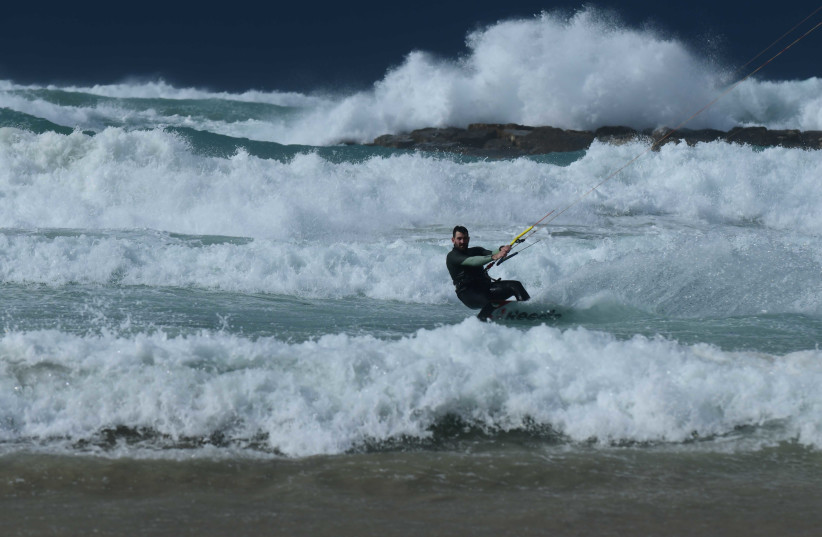In Netanya, intrepid surfers are riding the high waves of the Mediterranean Sea. I watch them from across King David Street as I swim in calmer waters, the heated pool of the David Tower hotel. The only others in the pool with me are a romancing young couple – a striking young woman and a handsome young man – who turn out to be lone soldiers from France. They’re taking advantage of a rare furlough and one of the various day spa packages offered by David Tower.
Opened in 2017, David Tower is rebranding itself as a moderately-priced urban spa hotel. Purchased recently by the Prima Hotels chain, known for modest but well-located hotels, it is the first property in Prima’s new premium category, says General Manager Danny Ronen.
David Tower, 8 King David St., makes up the bottom seven floors of an apartment building in the center of the tourist section of Netanya, the pretty city named for Macy’s owner and philanthropist Nathan Strauss. There are 77 rooms, with a choice of sea or city views. An underground garage offers free parking.
In addition to the usual sea and sun vacations for which Netanya is lauded, David Tower offers a relaxing etnachta, a pause for locals and even tourists after intensive sightseeing. According to Ronen, currently their clientele tends to be business travelers in town because of Netanya’s growing hi-tech industry as companies move 32 km. north on the coast from Tel Aviv, where property is pricier.
Our large deluxe room with a sea view ($328 on Booking, including breakfast) is indeed “premium.” The room has parquet floors, a large two-meter deep balcony and the blend of modern and Middle Eastern furnishings in white by Tel Aviv-based international interior designer Michael Azoulay. The chairs are comfortable and the box-spring, double-pillow-top beds are from Aminach, a high-end Israeli manufacturer. Special touches include copious closets, free Wi-Fi, a Nespresso coffee machine and a huge rain-forest shower. An environmentally pleasing feature is the absence of the rows of shampoos and conditioners in plastic containers. Instead, refillable containers of spa-level shampoo, conditioner and shower gel are attached inside the shower.

Hotels need to have a story, according to modern public relations branding philosophy, and the previous owners bestowed upon David Tower a legend about a Turkish sultan and his search for a beautiful maiden. Around the hotel, there are maps of the sultan’s odyssey and a giant mural of the beloved young woman in the high-ceiling lobby. This beautiful woman also appears in the most colorful and elaborate elevators I’ve ever seen. The Turkish theme resonates in the geometric designs and tasteful décor throughout the public areas and guest rooms.
On a weekday, the hotel is still lightly occupied – foreign tourists are just returning. Netanya’s usual ubiquitous Russian tourists are not visiting now. The off-season hotel is quiet, but you won’t hear children running around the hallways even on summer holiday. David Tower isn’t a family hotel – children under 16 aren’t allowed and there won’t be Shabbatot Hatan/Kallah family celebrations on the weekends. There are small outdoor weddings in the summertime.
Except for Shabbat and holidays or special orders by groups, no dinner is served. Both a signature chef restaurant and a hamburger-chips meat restaurant failed to attract enough volume to justify their existence, explains Ronen, and travelers prefer to indulge their different tastes in the plethora of Netanya restaurants.
My husband and I simply crossed the street to eat Moroccan food at Marrakesh, opting for the tasty mezes of salads and coriander-flavored fish balls in a spicy sauce.
While I am swimming, my husband makes good use of the workout room in the Via Maris spa, named for the ancient trade route. There’s a Turkish hammam – and a sauna, too. The sultan’s travels are reflected in the names of the treatments offered: among them Cherokee fire spirit, the journey to North America, Tui Na Shiatsu – the journey to China and Japan, and Sesame Ayurveda, the journey to India. But with the hotel still in post-corona transition and lower occupancy, I’m offered a simpler choice of three: Swedish, deep tissue or hot stones massage. I opt for the last.
The treatment rooms are beautifully designed – again with an oriental theme – and quiet. Masseuse Dina’s intuitive touch – the right mix of gentleness and strength, reverses the petrification of my shoulder blades. When she places the heated pillow beneath my neck, any stress not already dissipated disappears.
A full and rich (and certified kosher) Israeli breakfast is served in the dining area on the lobby level, with a good variety of cheeses and lightly seasoned salads. My favorite is quinoa and apple. The poached eggs in sweet and spicy sauce – not quite shakshuka – are a yummy Turkish touch. The fancy cheeses are delicately pre-cut in squares to avoid the usual waste. The rye bread is trimmed to fit exactly in the toaster. There are airy crepes and particularly delicious cheesecake, apple cake and poppy seed cakes.
In sunnier weather, Netanya’s nearby swimming beaches as well as a beach-elevator for those who don’t like walking down and up the steps that link King David Street with the water are minutes away. Netanya also boasts a long panoramic promenade for seaside strolling.
I loved being within a cozy, pampering environment with the wind blowing hard outside. Still, I’m sure I’d enjoy the combination of sea, sun and spa in warmer weather, as well.
The writer was a guest of the hotel.
